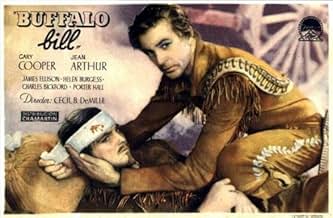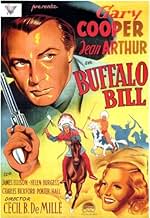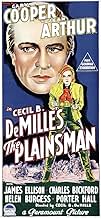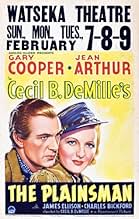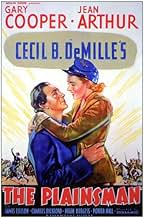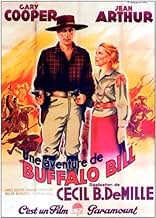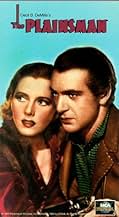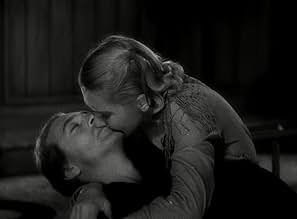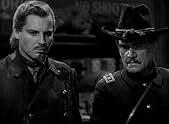IMDb-BEWERTUNG
6,8/10
2554
IHRE BEWERTUNG
Wild Bill Hickok versucht, einen Indianeraufstand zu stoppen, der von weißen Waffenschmugglern begonnen wurde.Wild Bill Hickok versucht, einen Indianeraufstand zu stoppen, der von weißen Waffenschmugglern begonnen wurde.Wild Bill Hickok versucht, einen Indianeraufstand zu stoppen, der von weißen Waffenschmugglern begonnen wurde.
- Auszeichnungen
- 3 wins total
Fred Kohler
- Jake - A Teamster
- (as Fred Kohler Sr.)
Pat Moriarity
- Sgt. McGinnis
- (as Pat Moriarty)
Empfohlene Bewertungen
Conceived and executed with all the brio typical of a De Mille epic - all the 64 pistols used in the film came from his personal collection - 'The Plainsman', for all its attention to petty historical detail (De Mille was insistent that the Phrase 'Go West, Young man' be correctly attributed to John B. Searle, the Editor of The Terra Haute Express) plays fast and loose with history.
Cooper is the austere Hickok, Ellison (a regular in the Hopalong Cassidy series, loaned to De Mille by 'Pops' Sherman)a boyish Buffalo Bill, Arthur a breezy Calamity Jane and Miljan a heroic Custer to whose defence all three come. Bickford is the smooth gun running villain. De Mille's well-practised abilities in handling big budgets, big casts and big stories overcame the doggedly domestic drama of Cooper and Arthur's relationship. Slow moving and overly romantic by modern standards in its depiction of Westward expansion, 'The Plainsman' remains an entertaining spectacle.
In 1966, Universal remade the movie as a vastly inferior telefilm.
Phil Hardy
Cooper is the austere Hickok, Ellison (a regular in the Hopalong Cassidy series, loaned to De Mille by 'Pops' Sherman)a boyish Buffalo Bill, Arthur a breezy Calamity Jane and Miljan a heroic Custer to whose defence all three come. Bickford is the smooth gun running villain. De Mille's well-practised abilities in handling big budgets, big casts and big stories overcame the doggedly domestic drama of Cooper and Arthur's relationship. Slow moving and overly romantic by modern standards in its depiction of Westward expansion, 'The Plainsman' remains an entertaining spectacle.
In 1966, Universal remade the movie as a vastly inferior telefilm.
Phil Hardy
This movie has Wild Bill Hickok, Calamity Jane, Buffalo Bill and General Custer all together. Gary Cooper plays Wild Bill and Jean Arthur plays Calamity Jane and Charles Bickford plays the bad guy who sells weapons to the Indians and you can hardly recognize him. This was the first time Cecil B. DeMille and Gary Cooper worked together and the next movie the made was basically the same but set in a different time. This movie starts out with Lincoln's assassination and it also deals with an Indian war. Calamity Jane is in love with Wild Bill and Buffalo Bill has gotten married and now wants to stay home. This movie also deals with Custer's last stand and is far from accurate. Gary Cooper is good as usual and i usually don't like Jean Arthur but i liked her here.
There were not a lot of Westerns in the 1930s, at least not in the A-budget bracket. So why would that canny marketeer and bandwagon-hopper Cecil B. DeMille decide to make one in 1936? The answer is simple. After the failure of his few dramas in the early talkie period, he vowed to make only "big" pictures, and the Old West was simply another historical arena for grand heroic exploits, just like the crusades or the high seas.
This being DeMille, the idea seems to have been to do a kind of definitive take on the setting. Waldemar Young and Harold Lamb, DeMille's current hacks-du-jour, along with "Oklahoma" playwright Lynn Riggs have created a screenplay that is not so much a cliché-fest as a cosy, sanitised and highly anachronistic snapshot of Western mythology. So we get Wild Bill Hickok, Calamity Jane, Buffalo Bill and General Custer all cheerfully rubbing shoulders like an Old West version of The League of Extraordinary Gentlemen, and banding together against the common enemy (the injuns, of course). DeMille's penchant for historical accuracy may give the sets and costumes a look of authenticity, but does not extend as far as actually portraying Calamity as a drunken prostitute, and Hickok as a kind of 19th-century Lemmy from Motorhead.
The two leads may not look like their historical counterparts, but at least Gary Cooper and Jean Arthur have the rugged demeanour of frontierspeople. They are also good enough performers to do a decent job despite a lack of coaching from DeMille. But as is often the case, the most interesting players are the villains. Charles Bickford looks as if he was chiselled from the buttes of the plains themselves, and gives a performance comparable to Walter Huston's Trampas in the 1929 version of The Virginian. Victor Varconi, once a handsome lead man in the silents, now thanks to his accent and looks reduced to playing all manner of swarthy baddies, is compellingly menacing as Painted Horse. And finally a young Anthony Quinn makes a short but impressive appearance as a Cheyenne warrior, lending a degree of dignity to the natives that is woefully absent in the rest of the picture.
DeMille himself though does not appear to have "got" the genre. Despite the title, we don't really get to see those plains, and there is none of the romance of the outdoor lifestyle that makes classic Westerns what they are. But looking at DeMille's style you can see he is not a fan of empty spaces. Bigness for him means fullness. He really goes to town on the steamboat boarding scene, conjuring up an image of lively bustle with people moving across the frame in layers receding in depth. This is a very effective way of making a place look crowded without having to place the camera too far back or hire out every extra on the books. In other scenes, such as the one where the townspeople threaten to tar and feather Jean Arthur he uses extras to build walls around the action, filling every spare space with people. Even in simpler scenes there tends to be a degree of complexity to the shot, like a classical painting that tries to cram every aspect of an idea onto the canvas. And DeMille's images are often beautiful in a painterly way, but still the lack of "west" on display stops this from feeling like a Western.
Think of this then more as an adventure yarn than a horse opera. It may be silly as silly can be (my favourite daft moment is in the opening scene, when Abe Lincoln's wife bursts into a meeting to remind him he's going to be late for the theatre, followed by a doom-laden chord in the background score), but it is not bad as far as no-brainer entertainment goes. The action scenes are exciting and punchy, largely thanks to the dynamic editing of Anne Bauchens. This is by no means essential DeMille, and certainly not essential Cooper, but is good fun if you happen to catch it.
This being DeMille, the idea seems to have been to do a kind of definitive take on the setting. Waldemar Young and Harold Lamb, DeMille's current hacks-du-jour, along with "Oklahoma" playwright Lynn Riggs have created a screenplay that is not so much a cliché-fest as a cosy, sanitised and highly anachronistic snapshot of Western mythology. So we get Wild Bill Hickok, Calamity Jane, Buffalo Bill and General Custer all cheerfully rubbing shoulders like an Old West version of The League of Extraordinary Gentlemen, and banding together against the common enemy (the injuns, of course). DeMille's penchant for historical accuracy may give the sets and costumes a look of authenticity, but does not extend as far as actually portraying Calamity as a drunken prostitute, and Hickok as a kind of 19th-century Lemmy from Motorhead.
The two leads may not look like their historical counterparts, but at least Gary Cooper and Jean Arthur have the rugged demeanour of frontierspeople. They are also good enough performers to do a decent job despite a lack of coaching from DeMille. But as is often the case, the most interesting players are the villains. Charles Bickford looks as if he was chiselled from the buttes of the plains themselves, and gives a performance comparable to Walter Huston's Trampas in the 1929 version of The Virginian. Victor Varconi, once a handsome lead man in the silents, now thanks to his accent and looks reduced to playing all manner of swarthy baddies, is compellingly menacing as Painted Horse. And finally a young Anthony Quinn makes a short but impressive appearance as a Cheyenne warrior, lending a degree of dignity to the natives that is woefully absent in the rest of the picture.
DeMille himself though does not appear to have "got" the genre. Despite the title, we don't really get to see those plains, and there is none of the romance of the outdoor lifestyle that makes classic Westerns what they are. But looking at DeMille's style you can see he is not a fan of empty spaces. Bigness for him means fullness. He really goes to town on the steamboat boarding scene, conjuring up an image of lively bustle with people moving across the frame in layers receding in depth. This is a very effective way of making a place look crowded without having to place the camera too far back or hire out every extra on the books. In other scenes, such as the one where the townspeople threaten to tar and feather Jean Arthur he uses extras to build walls around the action, filling every spare space with people. Even in simpler scenes there tends to be a degree of complexity to the shot, like a classical painting that tries to cram every aspect of an idea onto the canvas. And DeMille's images are often beautiful in a painterly way, but still the lack of "west" on display stops this from feeling like a Western.
Think of this then more as an adventure yarn than a horse opera. It may be silly as silly can be (my favourite daft moment is in the opening scene, when Abe Lincoln's wife bursts into a meeting to remind him he's going to be late for the theatre, followed by a doom-laden chord in the background score), but it is not bad as far as no-brainer entertainment goes. The action scenes are exciting and punchy, largely thanks to the dynamic editing of Anne Bauchens. This is by no means essential DeMille, and certainly not essential Cooper, but is good fun if you happen to catch it.
This Cecil B. DeMille epic of the old West contains what may be Jean Arthur's finest performance, as a hysterical, eccentric, incurably amoral, but devotedly doting Calamity Jane. She really pulled it off! Gary Cooper is at his most taciturn, but manages some occasional pithy sayings: 'The plains are big, but trails cross ... sometimes.' The story is a pastiche to end all pastiches. All the cowboy heroes of Western lore seem to be in there somehow except for Jesse James. Even Abraham Lincoln opens the story in person (or at least, DeMille would have us believe so). There is no room for anything so evanescent as subtlety, this is a 'stomp 'em in the face' tale for the masses. A remarkable thing about this film however is that it is a very early full frontal attack on what Eisenhower was eventually to name 'the military industrial complex'. It isn't just a story about gun-runners, but about arming anyone for money, and doing so from the heart of Washington. But let's not get into politics, let's leave that to DeMille, who can be guaranteed to be superficial. The chief interest of this film all these years later is that it uses the first film score composed by George Antheil, who has a lot to say about the job in his autobiography, 'Bad Boy of Music'. Antheil seems to have originated 'the big sound' adopted by all subsequent Westerns, whereby the plains sing out with the voices and sounds of countless cowboys in the sky, celebrating the open spaces and interweaving common melodies. That is why it does not sound at all unusual, because we have heard it a thousand times. But he seems to have been the first to summon up the combined rustlings of all the sage brush into this symphony of the open skies which has entered into American mythic lore, and given it a soundtrack which has never varied since then, corny as it may be, but doubtless appropriate. It is amusing to see Anthony Quinn in an early appearance as a Cheyenne Indian. Gabby Hayes is in there somewhere, but you miss him in the crowd. Gary Cooper overtops them all, looming large, - but when did he ever loom small?
After the failure of "The Crusades" at the box office, Cecil B. DeMille stopped doing films about non-American history. His films for the next thirteen years were about our history from Jean Lafitte to World War II (Dr. Wassell). The first in order of production was this film, starring Gary Cooper as Wild Bill Hickok, with Jean Arthur as Calamity Jane. James Ellison was Buffalo Bill, John Miljan (not a villain as usual) was General George A. Custer, and Anthony Quinn was one of the Indians who fought at Little Big Horn. The villains were led by Charles Bickford (selling arms to the Indians) and Porter Hall as Jack McCall (who killed Wild Bill Hickok).
Basically the film takes up the history of the U.S. after the Civil War. Lincoln is shown at the start talking about what is the next step now that Lee has surrendered. Lincoln talks about the need to secure the west (more about this point later). Then he announces he has to go to the theater. That April 14th must have been very busy for Abe - in "Virginia City" he grants a pardon to Errol Flynn at the request of Miriam Hopkins on the same date.
Actually, while Lincoln was concerned about the West, his immediate thoughts on the last day of his Presidency were about reunifying the former Confederate states and it's citizens into the Union as soon as possible. It was Reconstruction that occupied his attention, not the west (except for the problems of Maximillian and his French controlled forces in Mexico against Juarez). But he had been involved in actual problems with the West. In 1862 he sent disgraced General John Pope, the loser at Second Manassas, to Minnesota to put down a serious Indian war by the Sioux (the subject of McKinley Kantor's novel, "Sprit Lake". Pope, incompetent against Lee and Jackson, turned out to be quite effective here, and the revolt was smashed.
However, with all Lincoln's actual attention to western problems, it is doubtful that he says (as Cooper repeats at least once), "The frontier should be secure." There is nothing to say he could not have said it, but it is hardly a profound pronouncement by a leading statesman. Like saying, Teddy Roosevelt said, "Eat a good breakfast every morning for your health." It is not a profound statement of policy. It is, at best, a statement of recognizable fact. Cooper turning it into a minor mantra, like Lincoln's version of the Monroe Doctrine, is ridiculous...typical of the way DeMille's scripts have really bad errors of common sense in them.
However, this is not a ruinous mistake. "The Plainsman" is an adventure film, and as such it has the full benefit of DeMille the film creator of spectacle. As such it is well worth watching. But not as a textbook on Lincoln's political ideas or his quotable legacy.
Basically the film takes up the history of the U.S. after the Civil War. Lincoln is shown at the start talking about what is the next step now that Lee has surrendered. Lincoln talks about the need to secure the west (more about this point later). Then he announces he has to go to the theater. That April 14th must have been very busy for Abe - in "Virginia City" he grants a pardon to Errol Flynn at the request of Miriam Hopkins on the same date.
Actually, while Lincoln was concerned about the West, his immediate thoughts on the last day of his Presidency were about reunifying the former Confederate states and it's citizens into the Union as soon as possible. It was Reconstruction that occupied his attention, not the west (except for the problems of Maximillian and his French controlled forces in Mexico against Juarez). But he had been involved in actual problems with the West. In 1862 he sent disgraced General John Pope, the loser at Second Manassas, to Minnesota to put down a serious Indian war by the Sioux (the subject of McKinley Kantor's novel, "Sprit Lake". Pope, incompetent against Lee and Jackson, turned out to be quite effective here, and the revolt was smashed.
However, with all Lincoln's actual attention to western problems, it is doubtful that he says (as Cooper repeats at least once), "The frontier should be secure." There is nothing to say he could not have said it, but it is hardly a profound pronouncement by a leading statesman. Like saying, Teddy Roosevelt said, "Eat a good breakfast every morning for your health." It is not a profound statement of policy. It is, at best, a statement of recognizable fact. Cooper turning it into a minor mantra, like Lincoln's version of the Monroe Doctrine, is ridiculous...typical of the way DeMille's scripts have really bad errors of common sense in them.
However, this is not a ruinous mistake. "The Plainsman" is an adventure film, and as such it has the full benefit of DeMille the film creator of spectacle. As such it is well worth watching. But not as a textbook on Lincoln's political ideas or his quotable legacy.
Wusstest du schon
- WissenswertesJohn Wayne very much wanted the role of Wild Bill Hickok, which he felt certain would make him a star, but director Cecil B. DeMille wanted Gary Cooper instead.
- PatzerOn the evening of Lincoln's assassination Van Ellyn and his associates are discussing the supposedly then current John Soule editorial, "Go West, Young Man." Lincoln was murdered in 1865. Soule wrote that famous line in 1851.
- Zitate
Calamity Jane: Tip your hat when you speak to a lady!
Wild Bill Hickok: I will... when I speak to a lady.
- Alternative VersionenThe UK DVD is cut by 2 secs to remove a horsefall.
- VerbindungenFeatured in The Hollywood Collection: Anthony Quinn an Original (1990)
- SoundtracksWhen Johnny Comes Marching Home
(1863) (uncredited)
Written by Louis Lambert
Played as background music for the first scene, Washington, D.C.
Top-Auswahl
Melde dich zum Bewerten an und greife auf die Watchlist für personalisierte Empfehlungen zu.
- How long is The Plainsman?Powered by Alexa
Details
- Erscheinungsdatum
- Herkunftsland
- Sprache
- Auch bekannt als
- Der Held der Prärie
- Drehorte
- Cheyenne Indian Reservation, Lame Deer, Montana, USA(Custer's massacre)
- Produktionsfirma
- Weitere beteiligte Unternehmen bei IMDbPro anzeigen
Box Office
- Budget
- 1.000.000 $ (geschätzt)
- Laufzeit1 Stunde 53 Minuten
- Farbe
- Seitenverhältnis
- 1.37 : 1
Zu dieser Seite beitragen
Bearbeitung vorschlagen oder fehlenden Inhalt hinzufügen


